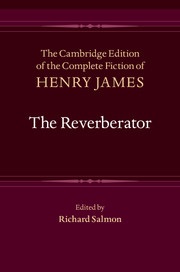Book contents
- Frontmatter
- Contents
- List of Illustrations
- Acknowledgements
- List of Abbreviations
- General Editors’ Preface
- General Chronology of James’s Life and Writings
- Introduction
- Textual Introduction
- Chronology of Composition and Production
- Bibliography
- The Reverberator
- Glossary of Foreign Words and Phrases
- Notes
- Textual Variants I : Substantive Variants up to Copy Text
- Textual Variants II : Substantive Variants after Copy Text
- Emendations
- Appendices
Introduction
Published online by Cambridge University Press: 23 April 2021
- Frontmatter
- Contents
- List of Illustrations
- Acknowledgements
- List of Abbreviations
- General Editors’ Preface
- General Chronology of James’s Life and Writings
- Introduction
- Textual Introduction
- Chronology of Composition and Production
- Bibliography
- The Reverberator
- Glossary of Foreign Words and Phrases
- Notes
- Textual Variants I : Substantive Variants up to Copy Text
- Textual Variants II : Substantive Variants after Copy Text
- Emendations
- Appendices
Summary
Sources and Conception
The conception of The Reverberator can be traced to a series of public controversies involving individuals with whom James was personally acquainted, which unfolded in American and British newspapers of the mid-1880s. In his Notebook entry for Thursday 17 November 1887 (Appendix B, pp. 282–6), James refers to two unrelated instances of intru-sive journalism, both coincidentally published in the New York World in close succession. His correspondence of the period points to further examples of a similar concern. The Notebook entry chiefly reflects on the ‘queer incident’ of a young American woman named Miss McC. (May Marcia McClellan) who, a year previously, had written an ‘inconceivable letter’ to an American newspaper commenting on the personal and collec-tive characteristics of Italian aristocratic families whose ‘hospitality she had just been enjoying’ in a resort near Lake Como (CN 40). Published on 14 November 1886 under the headline, ‘English, Even in Italy. All the Swells Modelled on British Fashions and Manners’ (Appendix A, pp. 278–81), McClellan's letter occupies only one column of The World's Sunday sup-plement edition and does not appear deliberately to court sensation or hint at scandalous secrets. Expressed in a gossipy, colloquial style, the writer's main point of observation is that the manners and fashions of Italian high society mimic those of the English: ‘it made me feel quite at home to see the preternaturally grave expression, the lurching walk and excessively British garments of these Latin dudes’, McClellan notes. Shortly afterwards (in December 1886 or the following January), James was introduced to May McClellan during a long stay in Florence, by which time he was already aware of the offence and scandal caused by her letter, despite it being written in ‘perfect good faith’ (CN 40). In a letter from Florence to his Venetian-American friend Katherine De Kay Bronson, tentatively dated 15 January 1887, James records visiting the McClellan family and concludes that ‘[t]hey have lived [.. .] in such an atmosphere of newspaper publicity and reporterism that they have lost all sense of perspective and proportion’. Although he admits to being ‘rather touched’ by the ‘girl's compunction’ at the consequences of her unfortunate act, James's sympathy lies more with the ‘poor little Montenegros’, the betrayed Italian family (HJL 3: 155).
Information
- Type
- Chapter
- Information
- The Reverberator , pp. xxvii - lxxviPublisher: Cambridge University PressPrint publication year: 2018
